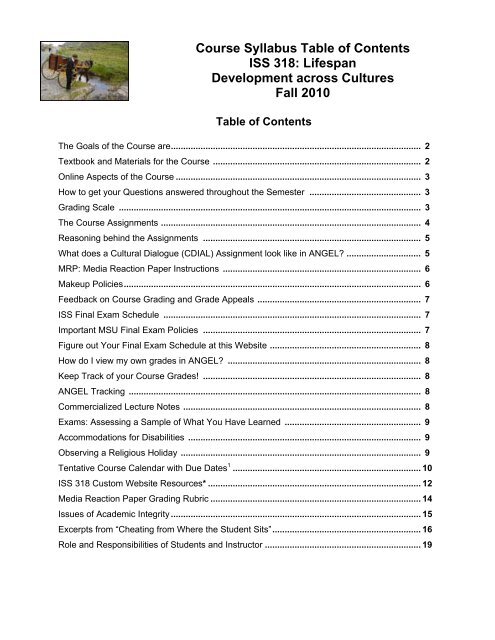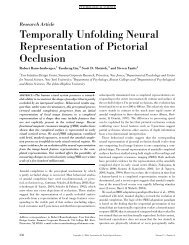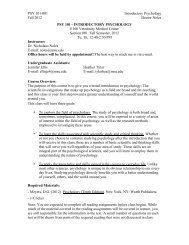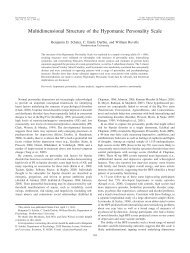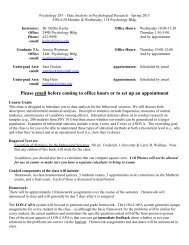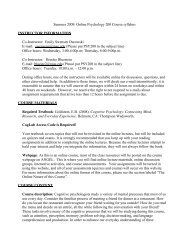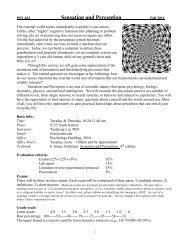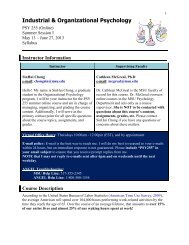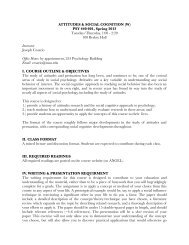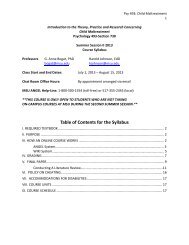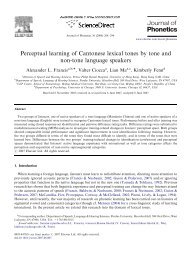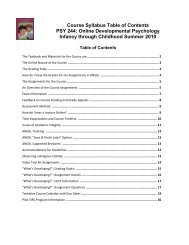Course Syllabus Table of Contents ISS 318: Lifespan Development ...
Course Syllabus Table of Contents ISS 318: Lifespan Development ...
Course Syllabus Table of Contents ISS 318: Lifespan Development ...
Create successful ePaper yourself
Turn your PDF publications into a flip-book with our unique Google optimized e-Paper software.
<strong>Course</strong> <strong>Syllabus</strong> <strong>Table</strong> <strong>of</strong> <strong>Contents</strong><br />
<strong>ISS</strong> <strong>318</strong>: <strong>Lifespan</strong><br />
<strong>Development</strong> across Cultures<br />
Fall 2010<br />
<strong>Table</strong> <strong>of</strong> <strong>Contents</strong><br />
The Goals <strong>of</strong> the <strong>Course</strong> are ..................................................................................................... 2<br />
Textbook and Materials for the <strong>Course</strong> .................................................................................... 2<br />
Online Aspects <strong>of</strong> the <strong>Course</strong> ................................................................................................... 3<br />
How to get your Questions answered throughout the Semester ............................................. 3<br />
Grading Scale .......................................................................................................................... 3<br />
The <strong>Course</strong> Assignments ......................................................................................................... 4<br />
Reasoning behind the Assignments ........................................................................................ 5<br />
What does a Cultural Dialogue (CDIAL) Assignment look like in ANGEL .............................. 5<br />
MRP: Media Reaction Paper Instructions ................................................................................ 6<br />
Makeup Policies ........................................................................................................................ 6<br />
Feedback on <strong>Course</strong> Grading and Grade Appeals .................................................................. 7<br />
<strong>ISS</strong> Final Exam Schedule ........................................................................................................ 7<br />
Important MSU Final Exam Policies ........................................................................................ 7<br />
Figure out Your Final Exam Schedule at this Website ............................................................. 8<br />
How do I view my own grades in ANGEL .............................................................................. 8<br />
Keep Track <strong>of</strong> your <strong>Course</strong> Grades! ........................................................................................ 8<br />
ANGEL Tracking ...................................................................................................................... 8<br />
Commercialized Lecture Notes ................................................................................................ 8<br />
Exams: Assessing a Sample <strong>of</strong> What You Have Learned ....................................................... 9<br />
Accommodations for Disabilities .............................................................................................. 9<br />
Observing a Religious Holiday ................................................................................................. 9<br />
Tentative <strong>Course</strong> Calendar with Due Dates 1 ............................................................................ 10<br />
<strong>ISS</strong> <strong>318</strong> Custom Website Resources* ...................................................................................... 12<br />
Media Reaction Paper Grading Rubric ..................................................................................... 14<br />
Issues <strong>of</strong> Academic Integrity ..................................................................................................... 15<br />
Excerpts from “Cheating from Where the Student Sits” ............................................................ 16<br />
Role and Responsibilities <strong>of</strong> Students and Instructor ............................................................... 19
<strong>ISS</strong> <strong>318</strong><br />
<strong>Lifespan</strong> <strong>Development</strong><br />
Across Cultures<br />
Fall 2010, 204 Natural Sciences Bldg<br />
Catalog Description:<br />
Cultural aspects <strong>of</strong> biopsychosocial development across the<br />
lifespan including: physical development, health and healing;<br />
cognition and language socialization; views <strong>of</strong> self, gender, family<br />
and social relationships; adult development and intergenerational<br />
relationships within the context <strong>of</strong> culture. National and<br />
international issues related to human development. (4 credits)<br />
Cathleen E. McGreal, Ph.D.<br />
Department <strong>of</strong> Psychology<br />
338 Psychology Building<br />
(517) 432‐0736<br />
mcgreal@msu.edu<br />
Office Hours and Locations:<br />
Monday: 3:00 to 4:00 p.m.<br />
338 Psychology Building<br />
Thursday: 10:15 to 11:00 at<br />
Sparty’s C<strong>of</strong>feehouse<br />
in Snyder/Phillips [Snyder side]<br />
Problems with ANGEL<br />
CALL MSU HELP LINE:<br />
1‐800‐500‐1554 or<br />
(517) 355‐2345<br />
The goals <strong>of</strong> the course are:<br />
To identify key themes <strong>of</strong> the cultural context <strong>of</strong> human development, including major theories and concepts <strong>of</strong><br />
development in different cultural/historical contexts as well as influential researchers and theorists.<br />
To examine how theories <strong>of</strong> development reflect the cultures from which they arise, thus evaluating how theories<br />
from one culture may lead to misinterpretations when applied to the developmental experiences <strong>of</strong><br />
individuals in another culture.<br />
To understand the research methods used in lifespan developmental psychology, anthropology and sociology<br />
(how we know what we know!) and to think critically when analyzing/generalizing research across cultures<br />
(what we know!).<br />
To gain awareness in regard to how individuals stay the same over time (continuities) and how individuals change<br />
(discontinuities) over the lifespan and across cultures<br />
To analyze developmental issues <strong>of</strong> global concern.<br />
To practice cooperative teamwork skills during in-class group activities and to integrate course concepts into your<br />
own life experiences.<br />
Textbook and materials for the course<br />
This is the cover <strong>of</strong> our textbook: <strong>Lifespan</strong> <strong>Development</strong> across Cultures<br />
Cover <strong>of</strong> Textbook<br />
The ISBN is 0536698554. The book has pages to write on/tear out.<br />
A Pearson Custom Publishing Resources Access Code will be provided to access<br />
the Custom Media Resources Site which contains video/audio resources related to<br />
our course. Caveat emptor - Let the buyer beware – Used books have expired<br />
codes and may have missing tear out pages for cross-cultural explorations<br />
This is the website URL where you will find these videos:<br />
http://www.pearsoncustom.com/mi/msu_mylabs/<br />
Textbooks are available through the Spartan Bookstore on the campus at Michigan<br />
State University http://www.spartanbook.com, the Student Book Store<br />
http://www.sbsmsu.com/ , Ned's Bookstore http://www.nedsbooks.com/msu/ or The<br />
College Store http://www.thecollegestore.com/msu/<br />
Michigan State University provides a list <strong>of</strong> nearby bookstores and their addresses<br />
and phone numbers at the following website:<br />
http://keywords.msu.edu/viewpathfinder.aspid=57#344<br />
If you cannot find the book/website package in a local bookstore, you can order it<br />
from Pearson at 1-800-947-7700, select option #5 then option #1. Ask for PKG<br />
ISBN: 0536698554 Prices are ‘list’ prices which are about $80.00
3<br />
Online Aspects <strong>of</strong> the <strong>Course</strong> …<br />
There will be some assignments and course content available through the ANGEL course management system.<br />
If there is a problem using the ANGEL system then please report it as soon as possible to the MSU HELP LINE at<br />
1-800-500-1554 or (517) 355-2345. (24 hours, 7 days a week). They will log the problem and in turn, report it to<br />
me. You may also report the problem to me (although I am not available 24/7 like the Help Line ) If there is a<br />
system problem then hearing about what happens from more than one student will help them discover what has<br />
gone wrong. If it is just a problem with your computer then they can help troubleshoot that issue, too. Keep the<br />
ANGEL help numbers by your computer in case there is a problem.<br />
How to get your questions answered throughout the semester<br />
First, check out the ANGEL FAQ discussion board. Another student may have had the same question earlier in<br />
the course and you won’t have to wait at all for your answer! If your answer is not there then send an email<br />
through ANGEL. (See below)<br />
You may want to post a question in the Class Lounge because another student may see it and happen to know the<br />
answer (especially if it is 2:00 a.m.!) The Class Lounge is a place to talk to other students. If it is <strong>of</strong> common<br />
interest I will move those details to the FAQs so that they are easy to find. The Class Lounge is a place to let each<br />
other know interesting information that relates to <strong>Lifespan</strong> <strong>Development</strong> across Cultures. For example, if you read<br />
something in the newspaper about raising children in another culture or see something in the news about health<br />
practices in another country it is great to let other students and me know about it. If you want to know a technical<br />
question about the course that needs my reply soon then send the question to me.<br />
When contacting me:<br />
1. CONTACT ME THROUGH ANGEL, NOT THROUGH MSU MAIL – you will already be in that site if you<br />
are checking the FAQs! .<br />
2. Put <strong>ISS</strong> <strong>318</strong> in the Subject Line <strong>of</strong> your Email.<br />
Given the large number <strong>of</strong> emails that instructors receive this allows me to give current students first priority.<br />
Direct your concerns to “FACULTY” and I will try to answer you within 24 hours, Monday through Friday. I may<br />
reply through MSU mail but I’ll know the email came from our class because <strong>of</strong> the ANGEL heading and your<br />
subject line!<br />
Grading Scale<br />
GRADE<br />
4<br />
PERCENTAGE SCORE<br />
90 % to 100 %<br />
POINTS<br />
269 - 300<br />
Note: Students who score<br />
the minimum number <strong>of</strong><br />
points for a grade rejoice<br />
3.5 85 % to 89 % 254 - 268<br />
that they "just made it."<br />
Unfortunately, sometimes a<br />
3 80 % to 84 % 239 - 253<br />
score is at the very top <strong>of</strong> the<br />
range. The only points<br />
2.5 75 % to 79 % 224 - 238<br />
available are earned through<br />
assignments listed in the<br />
2 70 % to 74 % 209 - 223 syllabus. There are no ways<br />
to get more points after the<br />
1.5 65 % to 69 % 194 - 208 final, so please don't contact<br />
1 60 % to 64 % 179 - 193<br />
me if you are a point away<br />
from the next grade!<br />
0 < 60% #178<br />
If earning a particular grade is very important to you (for example, if you are on academic probation or if a certain<br />
grade is required to participate in sports or to graduate) then make sure that you do everything in your power<br />
throughout the semester to earn as many points as possible on the graded activities. Please don’t ask me to<br />
raise<br />
your grade at the end <strong>of</strong> the semester because you are only a point or two away from the grade that you wanted.
<strong>ISS</strong> <strong>318</strong>, Page<br />
“All genuine learning is active, not passive. It involves the use <strong>of</strong> the mind, not just the memory.<br />
It is a process <strong>of</strong> discovery, in which the student is the main agent, not the teacher.”<br />
Mortimer J. Adler in The Paideia Proposal: An Educational Manifesto. (1982, page 128)<br />
The <strong>Course</strong> Assignments…<br />
Exams 1, 2, and 3 and Final Exam – 65 points each, 195 points total (one will be dropped)<br />
These tests will include objective questions and short answer/essays questions. They include all information covered in<br />
that part <strong>of</strong> the course: textbook, lectures, video, and so on. Exam 1 covers Chapters 1,2,3,4 and lecture, video,<br />
readings, activities relating to these chapters. Exam 2 covers Chapters 5,6,7,8 and lecture, video, readings, activities<br />
relating to these chapters. Exam 3 covers Chapters 9, 10 11,12, Death and Dying section, and lecture, video, readings,<br />
activities relating to these chapters. The Final Exam is comprehensive. You may take all four exams and drop the lowest<br />
score. If you miss one <strong>of</strong> the exams, however, this is the “lowest score” that is dropped. (Note: There are no makeups<br />
–the reason that one can be dropped is because students sometimes are ill or have other unfortunate situations<br />
at the time <strong>of</strong> an exam. MSU final exam policies are followed.)<br />
CCE: Cross Cultural Explorations - Activities in Culture and Psychology, 5 points each, 40 points<br />
total [12 Total, choose 8 to complete]<br />
These activities involve work from pages 413 to 466 <strong>of</strong> your textbook. They require that you use critical thinking skills and<br />
be able to look at topics from different perspectives rather than give "one correct answer". They are graded with that in<br />
mind. This is a “stress reduction assignment” and so you may not turn in more than eight papers. Look ahead at the<br />
semester and see when you want to plan to lighten your work load a bit. This is a healthy assignment choice for me as<br />
well because over the course <strong>of</strong> the semester I will be grading 100 fewer cross-cultural explorations. When we get to the<br />
chapter on Health across Cultures think about ways in which you can add healthy time management skills into your<br />
career! Turn in these assignments on the workbook pages themselves or on Xerox copies <strong>of</strong> the workbook page<br />
for full points.<br />
MRP: Media Reaction Papers: 5 points each, 40 points total [12 Total choose 8 to complete]<br />
These papers are typed, single-space, single-page reaction papers to the video resources (or audio) that are found in the<br />
Custom Website: http://www.pearsoncustom.com/mi/msu_mylabs/ . You must use your access code in order to register<br />
to see the videos because they are copyright-protected. A 5-point paper will use the information found in ONE <strong>of</strong> the<br />
videotapes and analyze it in the context <strong>of</strong> our course. It is possible to write a 5-point paper in two well-written concise<br />
paragraphs. The grading rubric is found later in the syllabus.<br />
There are 12 assigned Media Reaction Papers but you only turn in 8. You choose the 8 that you want to complete. You<br />
may not turn in more than eight. For example, if your birthday falls on one <strong>of</strong> the due dates or if you have a test on one<br />
<strong>of</strong> those dates you might choose that as your "stress reduction" day. This is a stress reducer for me, too, because it<br />
reduces the number <strong>of</strong> papers that I read and grade by 100 papers!! Pr<strong>of</strong>essors need to make healthy life choices as<br />
well! If you miss one <strong>of</strong> the deadlines that one will be dropped. There are no make-ups for this assignment since you get<br />
to choose which ones to skip. If you accidentally turned in more than eight then only the first eight would count. An<br />
electronic copy is turned in to the ANGEL drop box (.rtf, .doc, or .docx ONLY or this is one <strong>of</strong> the papers that is a “stressreduction”<br />
skipped assignment that will not be graded) and a hard copy is brought to class to be shared and then turned<br />
in. Your grade will be seen on the online rubric on the electronic copy.<br />
CDIAL: Cultural Dialogues: 1 point each, 12 points total. [12 Total, Complete ALL 12]<br />
The cultural dialogues are in ANGEL folders at the beginning <strong>of</strong> each chapter. For example, click on Chapter 1. You will<br />
see a picture <strong>of</strong> a man and below his picture is a question asking, "How would you conduct research to explore the<br />
cultural experiences <strong>of</strong> disciples <strong>of</strong> Sikhism" Below the question you will see a section in which you type a very brief<br />
response. When you have finished then click on "Submit here to submit answer" underneath the question mark! You will<br />
receive feedback about this topic. There are 12 Cultural Dialogue activities. There are no make-ups for Cultural<br />
Dialogues. If you add the class late or miss one then you should do the Extra Credit. This is one <strong>of</strong> the reasons that we<br />
have it! It is STRONGLY recommended that you complete Cultural Dialogues at the beginning <strong>of</strong> each week but<br />
you MUST complete them by the Friday at 5:00 p.m. when we start that topic!
Surveys, 3 Surveys, 1 point each, 3 points total. [3 Total, Complete all 3]<br />
Surveys will be given to get your feedback. It is helpful for me to ask questions now and then to keep tabs on the way the<br />
course is going. There are no make-ups for missed surveys. SIRS and SOCT forms are great for future classes but these<br />
are great for our class!<br />
Sources <strong>of</strong> your Cultural Beliefs. 10 points.<br />
In the media website for Chapter 8 you will find an exercise called “The Sources <strong>of</strong> your Cultural Beliefs”. You will<br />
notice that it is an assignment rather than the typical media found on the site. Type up the answers to the<br />
questions in this exercise using either paragraph or list responses. This assignment is due on November 2 and it is<br />
turned in to the ANGEL drop box with the assignment’s name.<br />
Extra Credit (Your Own Media Integration for the Class). 10 points.<br />
This assignment is due on December 1 (Thursday) and will be presented in class (more details to follow).<br />
Reasoning behind the Assignments: Cultural Concepts <strong>of</strong> Health and Healing AND our<br />
Assignments<br />
In Chapter 10 we will analyze cultural concepts <strong>of</strong> health and healing. Time Management is mentioned as an important<br />
aspect <strong>of</strong> college life earlier in the syllabus. It is important to consider ways to reduce stress and manage time in healthy<br />
ways throughout the lifespan. Students may wonder why they cannot complete all the Media Reaction Papers and just<br />
drop the lowest grades. Why choose topics Sometimes pr<strong>of</strong>essors choose how many assignments to give based on<br />
how many papers they plan to grade. However, this solution allows you choice in terms <strong>of</strong> topics <strong>of</strong> interest as well as<br />
scheduling flexibility into weeks that may need a bit more give-and-take! That is why the choice is <strong>of</strong>fered in the Media<br />
Reaction Papers and Cross Cultural Explorations. It is a healthy time management strategy for the instructor and gives<br />
students options that they wouldn’t have had otherwise.<br />
What does a Cultural Dialogue Assignment look like in ANGEL<br />
The following screen shot shows the question you will answer when you begin Chapter 6!<br />
These are found in the ANGEL site. They are called C-DIALS in ANGEL. As you can see there is a very small section for<br />
your answer and you are not expected to have done any reading before you answer the question! Just let your answer<br />
flow, as if a friend just asked the question at Biggby’s!
<strong>ISS</strong> <strong>318</strong>, Page<br />
MRP: Media Reaction Paper Instructions<br />
1. Go to the Custom Website - The link is found on the Units Page. The enrollment code that provides access to this site<br />
is packaged with your textbook or purchased separately online.<br />
2. Watch/Listen to the Media for the Current Week. The week by week list is at the end <strong>of</strong> the syllabus. MAKE SURE<br />
YOU WRITE YOUR PAPER ABOUT THE CORRECT VIDEO (DON’T GET YOUR WEEKS MIXED UP!!!) Be extra<br />
careful because Chapter 10 is divided into two sections with different due dates. Although there is no Chapter<br />
12, there is an MRP #12 because <strong>of</strong> the two sections in Chapter 10.<br />
3. Choose ONE video/audio selection from the available selections to be the topic <strong>of</strong> your paper. Long after the course<br />
ends there will be situations in which course content comes up in everyday life. This assignment helps integrate<br />
course concepts and material from media sources. Note: You are expected to know the material in all the media<br />
resources each week but you need to write a paper on only one <strong>of</strong> these resources.<br />
4. Keep the Grading Rubric in mind as you write your paper. The Grading Rubric is found at the end <strong>of</strong> the syllabus, right<br />
after the week by week list <strong>of</strong> media.<br />
The paper isn't just a description <strong>of</strong> what happens in the videotape or just a paper showing that you comprehend the<br />
points being made. If you are familiar with Bloom's Taxonomy the choice <strong>of</strong> the word "analyze" was a deliberate choice<br />
in this assignment! Bloom's taxonomy gives a hierarchy <strong>of</strong> the development <strong>of</strong> intellectual skills. Analysis goes beyond<br />
just describing or summarizing. Integrate the video into concepts that you are learning about in the course! This is a way<br />
that you will be transferring your learning from this course long after the semester ends. When you watch a NOVA show<br />
in 2012 there might be moments when you find yourself integrating course concepts! [By the way, when this happens, let<br />
me know. I love to hear about learning that goes beyond a semester!]<br />
You may have several videos from which to choose each week when writing the paper. These are short videos. Watch<br />
them all because their content may appear on the exams! Some videos suggest sending emails about the content.<br />
You don’t need to do that since you are choosing a one <strong>of</strong> the media resources to write about in detail.<br />
Makeup Policies<br />
A first missed exam is covered since you can drop an exam. In the case <strong>of</strong> a second missed exam, make-up exams will<br />
be <strong>of</strong>fered only to those who have a significant illness documented by a letter from a physician or those who have a<br />
serious family problem (e.g., death <strong>of</strong> a family member) that precludes them from taking the second missed exam on the<br />
scheduled day (this must also be documented). Students who miss an exam without satisfying these conditions will<br />
receive a grade <strong>of</strong> zero for that exam. [MSU Final Exam policy will be followed if a final exam is missed] Makeup exams<br />
may have a different format (such as an essay format) but the information covered will be the same.<br />
It is best to complete written assignments ahead <strong>of</strong> time rather than waiting until the last minute in<br />
case you encounter problems with your computer, you can’t find a printer that is working, or you feel<br />
obligated to engage in unexpected activities just before a deadline. Life can be unpredictable at times!<br />
Don’t wait until the last minute to try to complete an assignment. Assignments are either available for an<br />
extended period <strong>of</strong> time or you are allowed to drop certain assignments – makeups are not available for these<br />
assignments. It isn’t a good plan to use all your stress-reducers the first month <br />
Use the chart to remember which assignments you are required to do and which assignments have some flexibility. Of<br />
course, if you add the class late and you have already missed deadlines, then those will be dropped. Or if you have<br />
waited until the last minute and then have a computer problem or an illness then that will be the assignment that gets<br />
dropped. You may want to submit many assignments early in the semester just in case you encounter a problem later.<br />
Or you might decide to skip assignments around significant dates in your life, such as a birthday!<br />
EXAM: Exam 1,2, 3 and Final<br />
CCE: Cross Cultural Explorations<br />
MRP: Media Reaction Papers<br />
CDIAL: Cultural Dialogues<br />
SURV: Surveys<br />
SOURCBELIEF<br />
1 Exam is dropped<br />
8 are turned in<br />
8 are turned in<br />
All are turned in<br />
Use all grades<br />
1 assignment
Feedback on <strong>Course</strong> Grading and Grade Appeals<br />
During the exam you can change any multiple-choice answer into a short-answer response.<br />
After an exam if you believe that you have answered a question correctly but it was marked wrong you can appeal that<br />
question. In order to appeal a question you must follow this format. Explain<br />
(1) Why your choice is the BEST answer.<br />
Document your explanation. Provide page numbers, lecture information, etc.<br />
(2) Explain why the choice that is marked as the correct answer is wrong or ambiguous.<br />
Important dates for Question Appeals:<br />
Exam 1 questions and anything due before it may be appealed through October 27.<br />
Exam 2 questions and anything due Exam 1 and Exam 2 may be appealed through November 23.<br />
Exam 3 questions may be appealed until the Final Exam.<br />
After the appeal dates all grades in the Gradebook are considered correct.<br />
FINAL EXAM:<br />
Make any final exam appeal immediately so that changes are made before grades are submitted to the Office <strong>of</strong> the<br />
Registrar: After grades are submitted then no additional changes to grades, exam scoring, etc. will be made.<br />
There are no exceptions to this rule unless I make calculation errors.<br />
<strong>ISS</strong> Final Exam Schedule<br />
<strong>ISS</strong> courses NO LONGER have common exams. This may have been true for your 200-level <strong>ISS</strong> class but it<br />
changed in the Fall <strong>of</strong> 2009. Our final follows the regular final exam schedule.<br />
Please make a note <strong>of</strong> this and plan to take the final as scheduled. MSU policy states: "No student should be required to<br />
take more than two examinations during any one day <strong>of</strong> the final examination period. Check your schedule early in the<br />
semester to make sure that you don’t have more than two final exams on the same day.<br />
If you have 3 finals in one day then you need to go to either:<br />
170 Bessey (main <strong>of</strong>fice, 355-3515) OR 229 Akers OR S33 Wonders. These <strong>of</strong>fices have a list <strong>of</strong> which classes have<br />
priority over others when it comes to the final exam. They will give you a form to take to the pr<strong>of</strong>essor who needs to<br />
schedule a makeup. Then you will return the form to them.<br />
If you get sick or something out <strong>of</strong> your control comes up during finals week then students must "notify the assistant<br />
deans <strong>of</strong> their colleges immediately." The dean will let me know, although I would appreciate that you cc the information<br />
to me also.<br />
Important MSU Final Exam Policies<br />
Another MSU final exam policy that is important to know:<br />
“A student absent from a final examination without a satisfactory explanation will receive a grade <strong>of</strong> 0.0 on the numerical<br />
system, NC on the CR-NC system, or an N in the case <strong>of</strong> a course authorized for grading on the P-N system. Students<br />
unable to take a final examination because <strong>of</strong> illness or other reason over which they have no control should notify the<br />
assistant deans <strong>of</strong> their colleges immediately."
<strong>ISS</strong> <strong>318</strong>, Page<br />
Figure Out Your Final Exam Schedule at this Website<br />
http://www.reg.msu.edu/ROInfo/Calendar/FinalExam.asp<br />
If Your Class Meets* Beginning at One <strong>of</strong> These Times Your Exam Date and Time Is<br />
TuTh<br />
8:00 a.m.<br />
Friday December 17<br />
or<br />
7:45-9:45 a.m.<br />
8:30 a.m.<br />
<strong>ISS</strong> <strong>318</strong><br />
<strong>ISS</strong> <strong>318</strong> Final Exam<br />
How do I view my own grades in ANGEL<br />
1. Go to the Report Tab.<br />
2. Choose Report under the Category Setting.<br />
3. Pick Grades from the Drop-Down List.<br />
4. Go over to the Right and click on Run.<br />
5. You will see all your points for each graded activity.<br />
6. By adding up these points you will be able to compare them to the scale in the syllabus to know your current grades at<br />
all times.<br />
Keep Track <strong>of</strong> Your <strong>Course</strong> Grades!<br />
At MSU, grades are the responsibility <strong>of</strong> the instructor and reflect your instructor’s evaluation <strong>of</strong> your work. If you have<br />
questions about how you have been assessed on your work or effort, you should contact the instructor as soon as<br />
possible after receiving the grade. See the earlier section <strong>of</strong> the syllabus for dates by which these grade appeals must be<br />
made. You should keep track <strong>of</strong> your attendance and grades and talk with the instructor if there is a problem. Students<br />
are responsible for keeping track <strong>of</strong> their course grades.<br />
ANGEL Tracking<br />
Please be aware that ANGEL tracks all student login information. For example, it tracks when you have logged into<br />
ANGEL and when you have logged out. This is helpful for the instructors because it allows us to resolve issues if there is<br />
a problem with the ANGEL system in terms <strong>of</strong> logging on and/or gaining access to the various sections <strong>of</strong> the site. ANGEL<br />
tracking also can reveal academic misconduct. Of course, pr<strong>of</strong>essors cannot view the personal content <strong>of</strong> a student in the<br />
“My Content” area <strong>of</strong> ANGEL.<br />
Commercialized Lecture Notes<br />
Commercialization <strong>of</strong> lecture notes and university-provided course materials is not permitted in this course
Exams: Assessing a Sample <strong>of</strong> What You have Learned<br />
Remember: Exams and Assignments SAMPLE the information that you<br />
learn! You will learn valuable knowledge that won't be assessed in class!<br />
This large oval<br />
represents what you<br />
have learned<br />
Important information<br />
Important information<br />
Important information<br />
Important information<br />
Important information<br />
Important information<br />
Important information<br />
Important information<br />
Important information<br />
Important information<br />
Important information<br />
Sample <strong>of</strong><br />
important<br />
information<br />
Since there isn’t time to ask you<br />
EVERYTHING that is important,<br />
the smaller oval represents a sample<br />
<strong>of</strong> your knowledge. I assume that you<br />
would be able to answer other questions<br />
just as well if we had more time for exams<br />
and assignments!<br />
Accommodations for Disabilities<br />
Students with disabilities should contact the Resource Center for Persons with Disabilities to establish reasonable<br />
accommodations. Contact RCPD by phone at (517) 353-9642 (voice) or (517) 355-1293 (TTY). Visit the RCPD website at<br />
http://www.rcpd.msu.edu/Home/<br />
or send them an email at rcpd@msu.edu<br />
Send your VISA document by email on or bring a copy as soon as possible.<br />
Observing a Religious Holiday<br />
You may make up coursework missed to observe a religious holiday; make arrangements in advance with the instructor.<br />
Look over the course dates at the beginning <strong>of</strong> the semester and see if an exam falls on one <strong>of</strong> these days. I’ve included<br />
some holidays that students have mentioned in the past in the syllabus to heighten our awareness <strong>of</strong> these special days.<br />
If there is a holiday for me to include that you celebrate just let me know!
<strong>ISS</strong> <strong>318</strong>, Page<br />
Tentative <strong>Course</strong> Calendar with Due Dates i<br />
Mon. Tuesday Wed. Thursday Fri.<br />
Week 1<br />
<strong>Development</strong> Across Cultures and<br />
the Social Sciences; Theory<br />
Sept. 1 Ecclesiastical Year begins –<br />
Orthodox Christian<br />
Sept.1<br />
Semester<br />
Begins<br />
September 2<br />
CCE #01<br />
Sept. 3<br />
Week 2<br />
Methodology in Cross-Cultural<br />
<strong>Development</strong><br />
Sept. 2 Krishna Janmashtami - Hindu<br />
Sept. 8-10 Rosh Hashanah – Jewish<br />
Sept. 10 Eid al Fitr‐ Ramadan ends ‐<br />
Islam<br />
Sept.6<br />
MSU<br />
Closed<br />
September 7<br />
MRP #01<br />
Sept. 8 September 9<br />
CCE #02<br />
Sept.<br />
10<br />
Week 3<br />
Cultural Variations in Socialization<br />
Sept. 12 Paryushana - Jain<br />
Sept. 17-18 Yom Kippur - Jewish<br />
Sept.<br />
13<br />
September 14<br />
MRP #02<br />
Sept. 15 September 16<br />
CCE #03<br />
Sept.17<br />
Week 4<br />
Cross-Cultural Perspectives on<br />
Physical <strong>Development</strong><br />
Sept.<br />
20<br />
September 21<br />
MRP #03<br />
Sept.22 September 23<br />
CCE #04<br />
Sept.<br />
24<br />
Week 5<br />
Genetic Disorders:<br />
Cultural Responses<br />
Sept.<br />
27<br />
September 28<br />
MRP #04<br />
Sept. 29 September 30<br />
EXAM 1<br />
Chapters 1-4,<br />
Lectures, Activities<br />
Oct. 1<br />
Week 6<br />
Oct. 4 October 5<br />
Oct. 6 October 7<br />
Oct. 8<br />
Culture and Cognition Culture and<br />
Language<br />
MRP #05<br />
CCE #05<br />
Week 7<br />
Oct. 11 October 12<br />
Oct. 13 October 14<br />
Oct. 15<br />
Cultural Views <strong>of</strong> the Self as a<br />
Person<br />
MRP #06<br />
CCE #06<br />
Culture, Temperament and<br />
Personality<br />
Week 8<br />
Cultural Influences on Female and<br />
Male Socialization<br />
Oct. 17 Dasera - Hindu<br />
Oct.18 October 19<br />
MRP #07<br />
Oct. 20<br />
Middle <strong>of</strong><br />
Semester<br />
October 21<br />
CCE #07<br />
Oct. 22
Week 9<br />
Oct.25 October 26<br />
Oct. 27 October 28<br />
Oct. 29<br />
Culture and Social Behavior<br />
MRP #08<br />
CCE #08<br />
EXAM 2<br />
Chapters 5-8,<br />
Lectures, Activities<br />
Week 10<br />
Nov. 1 November 2<br />
Nov. 3 November 4<br />
Nov. 5<br />
The Family in Cultural Context<br />
Nov. 1 Samhaine – Pre‐Christian<br />
Celtic, Druid, Wicca,<br />
(Northern Hemisphere)<br />
All Saint’s Day – Christian<br />
Nov. 2 All Souls Day – Catholic<br />
Christian<br />
Nov 5 Diwali Hindu Sikh Jain<br />
The Sources <strong>of</strong> your<br />
Cultural Beliefs (Ch 8<br />
media website) exercise<br />
due<br />
SLOAN<br />
CONSORTIUM<br />
Lecture on ANGEL<br />
SLOAN<br />
CONSORTIUM<br />
On Online<br />
Learning<br />
Lecture on ANGEL<br />
Week 11<br />
Nov. 8 November 9<br />
Nov.10 November 11<br />
Nov. 12<br />
The Family in Cultural Context:<br />
Mate selection, Marriage; Birth<br />
process across cultures<br />
MRP #09<br />
CCE #09<br />
Week 12<br />
Family Relationships,<br />
Grandparenthood;<br />
Cultural Concepts <strong>of</strong> Health and<br />
Healing<br />
Nov 16 Eid al Adham – Islam<br />
Nov.<br />
15<br />
November 16<br />
Mrs. Palfrey at the<br />
Claremont<br />
MRP #10<br />
read the syllabus carefully<br />
to choose the correct<br />
media!<br />
Nov. 17 November 18<br />
CCE #10<br />
Nov. 19<br />
Week 13<br />
Death, Dying and Bereavement<br />
Across Cultures<br />
Nov 26 Day <strong>of</strong> Covenant‐ Baha’i<br />
Nov 28 First Sunday <strong>of</strong> Advent –<br />
Christian<br />
Nov.<br />
22<br />
November 23<br />
MRP #11<br />
CCE #11<br />
Nov. 24 November 25<br />
Thanksgiving<br />
Nov.26<br />
Break<br />
Week 14<br />
Death, Dying and Bereavement<br />
Across Cultures<br />
Dec 2‐9 Hanukkah – Jewish<br />
Nov.<br />
29<br />
November 30 Dec. 1 December 2<br />
Extra Credit<br />
Media Integration<br />
Due<br />
Dec. 3<br />
Week 15<br />
Dec. 6 December 7<br />
Dec. 8 December 9<br />
Dec. 10<br />
Looking to the Future<br />
Dec 6 Saint Nicholas Day – Christian<br />
Dec 8 Immaculate Conception <strong>of</strong> Mary<br />
– Catholic Christian<br />
CCE #12<br />
MRP #12<br />
EXAM 3<br />
Chapters 9-11<br />
Death & Dying,<br />
Lectures, Activities<br />
Week 16<br />
FINAL EXAM WEEK<br />
Dec 12 Feast Day <strong>of</strong> Our Lady <strong>of</strong><br />
Guadalupe – Catholic Christian<br />
Friday<br />
December 17<br />
7:45-9:45 a.m. Same Classroom<br />
Final Exam - Comprehensive
<strong>ISS</strong> <strong>318</strong>, Page<br />
<strong>ISS</strong> <strong>318</strong> Custom Website Resources*<br />
Media associated with Chapter 1: (MRP #1)<br />
Building a Town on Sign Language (audio), Robert Sternberg on Practical Intelligence.<br />
Media associated with Chapter 2: (MRP #2)<br />
Diversity in Psychology Inquiry (still photo), Moral <strong>Development</strong>, The Zone <strong>of</strong> Proximal <strong>Development</strong>, Scaffolding<br />
Media associated with Chapter 3: (MRP #3)<br />
Breastfeeding; Remaining Physically Active in Midlife: Miss Janet, age 57; Exercise in Late Adulthood: Senior Line<br />
Dancing Class; Exercise Centenarian Perspectives: Onie, Age 107<br />
Media associated with Chapter 4: (MRP #4)<br />
Fetal Alcohol Syndrome, Doulas, and the Pregnant Body.<br />
Media associated with Chapter 5: (MRP#5)<br />
The Importance <strong>of</strong> Culture, The Sensorimotor Stage, Children’s Private Speech<br />
Media associated with Chapter 6: (MRP#6)<br />
Teens and Wicca (audiotape), Robert Sternberg on Cultural Influences, Nappy Hair Controversy, Self‐Recognition<br />
Media associated with Chapter 7: (MRP#7)<br />
Strombler: Study <strong>of</strong> Sex, Gender Intensification and Gender Schemas in Adolescence, Coping with Widowhood: Anna<br />
Mae, age 82<br />
Media associated with Chapter 8: (MRP#8)<br />
The Sources <strong>of</strong> Your Cultural Beliefs (separate exercise) , Age Myths, Attachment in Infants, Redefining Fatherhood<br />
Media associated with Chapter 9: (MRP#9)<br />
Cultural Background [Role in Marital Interaction], Labor and Birth, Marriage and Children, Death <strong>of</strong> the Family Dinner,<br />
Transcultural Adoption: Jane & Emily, Transition to Parenthood: Adena & Cooper, Joining <strong>of</strong> Families in Marriage, Dual‐<br />
Earner Families.<br />
Media associated with Chapter 10, Part A: Culture and Health Section (MRP#10)<br />
Before Informed Consent, Male Body Image
Media associated with Chapter 10, Part B: Death, Dying and Bereavement Section (MRP#11)<br />
Chuck, a Cancer Patient, Prepares for Death; Helping the Terminally Ill, The Hospice Approach, Coping with<br />
Bereavement, Grief and Meaning‐Making after the Loss <strong>of</strong> a Child: Heidi, Age 40.<br />
Media associated with Chapter 11: (MRP#12)<br />
Robert Sternberg on Giftedness<br />
* Pay particular attention to your choices for MRP #10, MRP #11 and MRP #12. Since MRP #10 and MRP #11 are both<br />
found in the Chapter 10 resources, make sure that you make an appropriate choice for each paper!
<strong>ISS</strong> <strong>318</strong>, Page<br />
Criteria<br />
MEDIA REACTION PAPER GRADING RUBRIC<br />
Achievement Level<br />
Integration with<br />
<strong>Course</strong> Concepts<br />
(25% Weighting)<br />
Bloom's<br />
Taxonomy<br />
(25% Weighting)<br />
Failing<br />
(0%)<br />
0 percent<br />
No attempt is<br />
made to integrate<br />
media with<br />
course concepts.<br />
0 percent<br />
No attempt to<br />
summarize,<br />
describe, or<br />
analyze media.<br />
Below Average<br />
(25%)<br />
6.25 percent<br />
An attempt is made to<br />
integrate media with<br />
course concepts but<br />
information may not<br />
be accurate or the<br />
details to explain why<br />
the course content is<br />
linked may not be<br />
provided.<br />
6.25 percent<br />
Inaccurate summary <strong>of</strong><br />
media; no analysis.<br />
Average<br />
(50%)<br />
12.5 percent<br />
Media is integrated<br />
with course content<br />
but the ideas are not<br />
fully developed.<br />
Supporting details<br />
are provided but are<br />
not integrated with<br />
the main point being<br />
made.<br />
12.5 percent<br />
Accurate<br />
summary/descriptio<br />
n <strong>of</strong> media but no<br />
analysis.<br />
Very Good/Strong<br />
(75%)<br />
18.75 percent<br />
Paper clearly show<br />
how course concepts<br />
illustrate a particular<br />
theoretical point.<br />
Ideas are fully<br />
developed. Although<br />
supporting details are<br />
provided there are no<br />
specific examples<br />
illustrating a course<br />
concept.<br />
18.75 percent<br />
Strong analysis <strong>of</strong><br />
media<br />
Exceptional/Superior<br />
(100%)<br />
25 percent<br />
Specific examples from<br />
media clearly show how<br />
course concepts illustrate<br />
a particular theoretical<br />
point. Ideas are fully<br />
developed.<br />
25 percent<br />
Exceptional analysis <strong>of</strong><br />
media<br />
Personal<br />
Experience<br />
(25% Weighting)<br />
0 percent<br />
No attempt to<br />
incorporate<br />
personal<br />
experiences into<br />
media reaction<br />
paper.<br />
6.25 percent<br />
Personal opinion or<br />
personal example that<br />
does not relate to the<br />
topic.<br />
12.5 percent<br />
Comments are made<br />
"about" topic but<br />
there are no<br />
personal examples<br />
and no engagement<br />
"with" the topic.<br />
18.75 percent<br />
A relevant example is<br />
provided from<br />
personal experience,<br />
other media viewed,<br />
an event observed, or<br />
something <strong>of</strong> a<br />
similar nature in<br />
order to add depth to<br />
the paper.<br />
25 percent<br />
Relevant insights are<br />
included to engage the<br />
reader. These may be<br />
from personal<br />
experience, other media<br />
viewed, an event<br />
observed, or something<br />
<strong>of</strong> a similar nature in<br />
order to add depth to the<br />
paper that is unique to<br />
the writer.<br />
Writing<br />
Style/Mechanics<br />
(15% Weighting)<br />
Format<br />
(10% Weighting)<br />
0 percent<br />
Serious<br />
organizational<br />
problems. The<br />
paper does not<br />
appear to have<br />
been planned<br />
before it was<br />
written. Many<br />
problems with<br />
sentence<br />
structure, or<br />
grammatical<br />
errors, or spelling<br />
errors.<br />
0 percent<br />
Paper is not<br />
typed, singlespaced,<br />
one-page<br />
in the assigned<br />
format.<br />
3.75 percent<br />
An attempt was made<br />
to plan the assignment<br />
but it remains<br />
disorganized in several<br />
places. There are<br />
several mechanical<br />
errors.<br />
7.5 percent<br />
The assignment has<br />
a sense <strong>of</strong><br />
organization. The<br />
opening and closing<br />
sections unite it<br />
adequately. There<br />
are some sentence<br />
structure problems,<br />
errors in grammar,<br />
and spelling<br />
problems. The<br />
writing style is<br />
simple and lacks<br />
creativity or depth.<br />
11.25 percent<br />
There are logical<br />
transitions in well<br />
organized paper. The<br />
opening and closing<br />
unite the paper in an<br />
effective framework.<br />
The paragraphs are<br />
well-constructed.<br />
There may be a few<br />
mechanical errors.<br />
15 percent<br />
The writing style is<br />
distinctive and confident.<br />
There are clear and<br />
logical transitions in a<br />
well organized paper.<br />
The opening and<br />
conclusion engage the<br />
reader and unite the<br />
paper providing an<br />
effective framework. The<br />
paragraphs are wellconstructed.<br />
There may<br />
be one or two mechanical<br />
errors that are not<br />
serious.<br />
2.5 percent 5 percent 7.5 percent 10 percent<br />
Paper is typed, singlespaced,<br />
one-page in the<br />
assigned format.
Issues <strong>of</strong> Academic Integrity<br />
Every student is held responsible for knowing the academic integrity policy at MSU. The policy can be found at<br />
http://www.vps.msu.edu/SpLife/rule32.htm<br />
Look through the folder that I’ve put up in the ANGEL site for some explanations about academic integrity to give you<br />
some concrete explanations.<br />
Here are some examples <strong>of</strong> academic dishonesty:<br />
• Have another student provide academic assistance or coaching during an online quiz or test<br />
• Have another person take a quiz or test for you<br />
• Copy questions or answers from any face-to-face or online quiz or test and share them with another student<br />
• Copy questions or answers from any face-to-face or online quiz or test and post them on a website for others to view<br />
• Get questions and/or answers from students who have already taken an exam or quiz you are scheduled to take<br />
• Collaborate with other students on projects or assignments without your instructor's permission<br />
Here are some definitions <strong>of</strong> plagiarism – make sure you avoid it!<br />
“a piece <strong>of</strong> writing that has been copied from someone else and is presented as being your own work” (Webster’s<br />
Dictionary Online)<br />
“claiming or submitting the academic work <strong>of</strong> another as one’s own”<br />
(Spartan Life: Student Handbook and Resource Guide, see pages 76-77, 108-109)<br />
http://www.vps.msu.edu/SPLife/default.pdf<br />
“the appropriation <strong>of</strong> another person’s ideas, processes, results, or words without giving appropriate credit” (White House<br />
Office <strong>of</strong> Sciences and Technology Policy on Misconduct on Research<br />
Information about cheating from the student’s point <strong>of</strong> view can be found at:<br />
http://www.msu.edu/unit/ombud/dishonestystud.html<br />
One <strong>of</strong> the responsibilities <strong>of</strong> being an MSU college student is to read the current issue <strong>of</strong> Michigan State University,<br />
Academic Programs (published by the Registrar's Office) for information about what constitutes scholastic dishonesty.<br />
Scholastic dishonesty will be prosecuted to the fullest extent in this class.<br />
You get a 0.0 in the class and a letter is written to your Dean and to mine about the incident. It is possible that the<br />
department may take steps to expel a student found guilty <strong>of</strong> cheating. A file will be kept that details why this grade was<br />
given.<br />
Most students are honest. Many students put in considerable effort and come in during <strong>of</strong>fice hours to earn a good grade<br />
and it isn't fair to them to give a student who cheats the same grade. Academic integrity is highly valued in a community<br />
<strong>of</strong> scholars. If an assignment hasn’t been discussed as a group assignment then assume that it is an individual<br />
assignment until you find out otherwise from a pr<strong>of</strong>essor.<br />
Don’t look at notes or other students’ papers during exams or plagiarize written work. Make sure that your cell phone and<br />
other electronic devices are put away. When in doubt about academic integrity, ask your pr<strong>of</strong>essor!
<strong>ISS</strong> <strong>318</strong>, Page<br />
Excerpts from "Cheating from Where the Student Sits"<br />
http://www.msu.edu/unit/ombud/dishonestystud.html<br />
Academic honesty and integrity are fundamental values in a community <strong>of</strong> scholars. As stated in the MSU<br />
Academic Freedom Report, students and faculty share a commitment to and responsibility for "maintaining the<br />
integrity <strong>of</strong> scholarship, grades, and pr<strong>of</strong>essional standards." To abuse these values is to assault one's own<br />
personal integrity and character. Yet cheating occurs on this campus and elsewhere. One researcher has called<br />
cheating an "international epidemic."<br />
The best way to protect yourself from an allegation <strong>of</strong> academic dishonesty is simple: Don't cheat. Read on for the<br />
answers to frequently asked questions on this topic, which is <strong>of</strong> increasing interest on campuses throughout the<br />
world.<br />
I think I know what cheating is, but how does MSU define cheating<br />
Start with the Academic Freedom Report, especially Article 2. Then move on to Protection <strong>of</strong> Scholarship and Grades.<br />
This defines academic dishonesty as conduct that violates the fundamental principles <strong>of</strong> truth, honesty, and integrity.<br />
The following conduct is specifically cited:<br />
supplying or using work or answers that are not one's own;<br />
providing or accepting assistance with completing assignments or examinations;<br />
interfering through any means with another's academic work;<br />
faking data or results.<br />
From this, it's obvious that you can't ‐‐ or at least shouldn't:<br />
turn in an exam, paper, or project that is not wholly your own work;<br />
copy answers from another student's exam or test;<br />
get questions and/or answers from students who have already taken an exam or quiz you are scheduled to take;<br />
have another person take a test for you;<br />
submit the same paper for two or more classes;<br />
use other authors' ideas and phrases without proper attribution; and<br />
collaborate with other students on projects or assignments without your instructor's permission.
How can I avoid even being suspected <strong>of</strong> cheating<br />
Your question assumes that innocent behavior can attract negative attention from instructors, and that may be true. To<br />
protect yourself from any suspicion <strong>of</strong> cheating, try the following.<br />
When taking quizzes, tests or exams:<br />
keep your eyes fixed firmly on your blue book or score sheet;<br />
don't take any unauthorized gear to the test site, (e.g., study notes, textbooks, calculators, cell phones);<br />
place your personal belongings under your desk and out <strong>of</strong> sight;<br />
don't fiddle (e.g., tap your pencil or fingers, rearrange your clothing);<br />
know what plagiarism is so you can avoid it.<br />
[Plagiarism (from the Latin plagiarius, an abductor, and plagiare, to steal): Plagiarism is defined as presenting<br />
another person's work or ideas as one's own.]<br />
What do I do if my instructor accuses me <strong>of</strong> cheating‐‐and I really didn't do it<br />
If this should happen, don't get angry or retaliate with rudeness. Take a deep breath, get out paper and pencil for note<br />
taking, and politely ask your instructor what evidence she or he has to support such a serious allegation. Carefully and<br />
calmly take notes on each point <strong>of</strong> evidence. Ask your instructor to meet with you as soon as possible so that you can<br />
present evidence to refute the allegation. Then, immediately locate witnesses or evidence (e.g., notes, drafts, study<br />
partners) that can be used to establish your innocence and take the information to the scheduled appointment with your<br />
instructor.<br />
You also may seek assistance from the Office <strong>of</strong> the Ombudsman. The Ombudsman can tell you what your rights are and<br />
explain the appeals process, should that be necessary. Briefly, an appeal for either the accusation or sanction begins with<br />
meeting with the instructor. If a resolution is not reached, the next step is to meet with the department chair/school<br />
director. A formal hearing would follow if the unit head or the Ombudsman cannot resolve the issue.<br />
What happens to me if I am guilty <strong>of</strong> cheating<br />
If your instructor believes you have committed an act <strong>of</strong> academic misconduct, s/he may issue a penalty grade, including,<br />
but not limited to, a failing grade on the assignment or in the course. If your instructor gives you a 0.0 in the course the<br />
Integrity <strong>of</strong> Scholarship and Grades All‐University Policy requires your instructor to send a letter to your dean to explain the<br />
circumstances. Depending on the seriousness and extent <strong>of</strong> violation, the dean can refer your case to your college hearing<br />
board for possible disciplinary action. The college hearing board can impose the following sanctions (AFR 4.2.4): issue a<br />
warning, place you on warning probation, institute disciplinary probation, or suspend you. Visit the Ombudsman to clarify<br />
the procedures and policies.<br />
Any other advice<br />
Again, don't cheat. The stakes are too costly for your academic career and your reputation. Faculty are increasingly resorting<br />
to various strategies to discourage their students from committing any acts <strong>of</strong> academic dishonesty, including stepping up<br />
their monitoring <strong>of</strong> students during exams. If you need assistance in passing a course, seek help from your instructor.<br />
The Learning Resources Center can provide you with strategies to improve your study skills and habits. Start on projects<br />
early in the term, give yourself adequate time to study for exams, and don't pressure yourself to be perfect
<strong>ISS</strong> <strong>318</strong> Page 19<br />
Student and Instructor Roles and Responsibilities<br />
Learning is an active process and it is hard work! You will determine how well you accomplish<br />
the goals. Many people are involved in your college education, but the most important person is<br />
YOU!<br />
Therefore, your role is to<br />
< organize your life so that you can attend class regularly. Plan to be present on exam days.<br />
Students are expected to attend class from the beginning to the end! It is disruptive to arrive late<br />
or to leave early.<br />
< keep up with the assignments/readings so that you can structure the knowledge we share in class.<br />
It is your responsibility to know when assignments are due based on the deadlines in the syllabus<br />
and/or the Weekly Checklist in ANGEL.<br />
< listen and learn from those around you, asking questions and participating in class discussions.<br />
< relate your knowledge to your own life (cognitive psychologists have found that the "Self‐reference"<br />
aspect <strong>of</strong> memory is powerful in terms <strong>of</strong> retention <strong>of</strong> material)<br />
< be engaged in the class! (sad to say, we don’t multi‐task as well as we think we do!)<br />
Important Note: As a courtesy to your classmates and instructor, please put all cell phones on<br />
vibrate mode and respond to your calls and texts after class unless it is an emergency that is<br />
important enough for us to disrupt our class. We DO want to know when DPS sends a message<br />
about a tornado warning. We can wait until after class to find out that Bubble Island is having $2.00<br />
specials! [If it is a non‐normative event that is personally very exciting that is OK, too. For example,<br />
one student found out she became an aunt during class and her reaction was enough to make<br />
everyone wonder about the message. Just be reasonable in whether it is appropriate to share].<br />
Newspapers, other reading materials, IPods, and any other distracting materials are not allowed<br />
in class; remember to turn them <strong>of</strong>f and put them away when class begins. They distract me as<br />
well as your classmates!<br />
Laptops on topic‐related sites are fine. Sites that are distracting to those around you or to me are<br />
not.<br />
A student cannot be actively engaged when sleeping in class. Many students have had the<br />
experience <strong>of</strong> feeling like you are falling when you go to sleep and suddenly you “jerk” awake<br />
(hypnic jerks). This is disconcerting when it happens in a classroom! Long hours <strong>of</strong> studying,<br />
working, and trying to maintain a social life can make it challenging to maintain the sleep schedule<br />
that you need. To balance your lifestyle a great resource is<br />
http://www.counseling.msu.edu/feature/wellness‐selfcare‐center<br />
Check out this website and then visit the center to help with your fatigue. We will wake you up if it<br />
happens in class but they can help get your lifestyle back in balance. Sleeping students are<br />
disruptive to an active learning environment. The National Sleep Foundation points out how<br />
critical sleep is to your success: "Sleep is food for the brain. During sleep, important body functions<br />
and brain activity occur. Skipping sleep can be harmful — even deadly, particularly if you are behind<br />
the wheel. You can look bad, you may feel moody, and you perform poorly. Sleepiness can make it<br />
hard to get along with your family and friends and hurt your scores on school exams, on the court or<br />
on the field. Remember: A brain that is hungry for sleep will get it, even when you don’t expect it."<br />
National Sleep Foundation, http://www.sleepfoundation.org/article/sleep‐topics/teens‐and‐sleep
What about eating in class Some pr<strong>of</strong>essors view food as distracting but I think that hunger is<br />
equally distracting! If you haven’t eaten breakfast then you need food! It is OK to bring food as<br />
long as you can eat it quietly (avoid carrots!). Just make sure you clean up any evidence when you<br />
leave <br />
In order to be an effective instructor, my role is to<br />
< facilitate your learning by structuring the course and class time.<br />
< select effective resources for your learning.<br />
< structure opportunities to learn from each other and from me.<br />
< give you feedback regarding your performance in the course.<br />
< establish a positive environment that fosters appreciation <strong>of</strong> the course topics.<br />
i<br />
Tentative <strong>Course</strong> Calendar with Due Dates: Why tentative I anticipate that these will be the<br />
dates that assignments, surveys, and exams will be due. However, I'm sure that many <strong>of</strong> us recall<br />
the Northeast Blackout that hit on August 14 <strong>of</strong> 2003. One never knows when schedules need to<br />
change for unexpected reasons, whether they are due to weather or energy grids! But given a<br />
predictable world these are the dates that we have scheduled!


